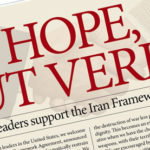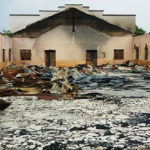TEHRAN, Iran (ABP)—While U.S. and Iranian diplomats made international headlines for negotiations on nuclear energy and weapons, a group of American and Iranian academics met quietly to heal broken relationships between the two nations.
 Rob NashThe American delegation, which departed for Iran Jan. 18, included two Baptists—James Jennings, founder of Conscience International, and Rob Nash, associate dean and professor of missions and world religions at Mercer University’s McAfee School of Theology. Both said they were eager to plant seeds that eventually could reduce tensions in the Middle East.
Rob NashThe American delegation, which departed for Iran Jan. 18, included two Baptists—James Jennings, founder of Conscience International, and Rob Nash, associate dean and professor of missions and world religions at Mercer University’s McAfee School of Theology. Both said they were eager to plant seeds that eventually could reduce tensions in the Middle East.
Jennings, a member of First Baptist Church in Gainesville, Ga., arranged the visit to break the ice between the two academic communities. He and Nash hope more visits—and thawing—will result.
“You’re at least starting to have the conversations” necessary to help “the melting of tension between the U.S. and Iran,” said Nash, a member at Druid Hills Baptist Church in Atlanta and interim pastor at First Baptist Church in nearby Jasper, Ga.
Observers should not expect any kind of treaty or promises on improving the treatment of Christians in Iran, said Nash, former global missions coordinator for the Cooperative Baptist Fellowship.
U. S. Academics for Peace
More than a dozen scholars from as many American universities participated in the 10-day venture led by Jennings’ U.S. Academics for Peace, an organization with a long track record of holding peace-promoting encounters with heads of state, other politicians and academics in some of the world’s most dangerous and strife-torn nations, including Iraq, Syria and the Sudan.
The visit was scheduled at a delicate moment in U.S.-Iranian relations. Jan. 20 marked the first day of a new deal between the two countries in which Iran agrees to halt controversial nuclear operations in exchange for easing economic sanctions. Watchdog groups also have flagged Iran for persecuting Christians.
The U.S. Academics for Peace participants did not know in advance what the agenda of the meetings definitely would include, although they proposed a conference schedule. Nash noted the issue of Christian persecution in Iran was not a scheduled topic of discussion, but that didn’t mean it might not be broached.
Sign up for our weekly edition and get all our headlines in your inbox on Thursdays
“Part of my experience with situations like this is you have to sort of feel your way as you go, and I don’t think there is any problem with asking some hard and challenging questions in the right context,” he said. Most likely, that topic will be discussed more easily in future exchanges, he added.
A history of peace outreach
The academic delegation is not the first time Baptists have been involved with easing political tensions between the United States and Iran. In 1979, Jimmy Allen, then president of the Southern Baptist Convention, pleaded for the release of the American hostages in Tehran and was criticized for appearing accommodating.
But the diplomatic atmosphere is much changed, thanks to recent elections in Iran, Jennings said. His meetings with Iran’s previous president, Mahmoud Ahmadinejad, went nowhere, but “when the new guy was elected, there began to be change,” he said.
Jennings is no stranger to Iran. He first worked there in 1991 to help refugees from the Gulf War. The 2003 earthquake in Bam, Iran, killed some 15,000 and brought Conscience International there for relief work. In 2005, his U.S. Academics for Peace visited for talks at Iranian universities.
“This is my first time back since the thawing out” of relations between the United States and Iran, he said.
And he is confident the latest visit can make a difference—at least in the long term. He sees a chance for that because, unlike politicians, scholars often are able to speak with each other candidly. In this case, Jennings’ group was scheduled to meet with the Tehran-based Institute for Political and International Studies.
“People in the academy have to speak truth to each other,” he said. “We’re not trying to float high-doctrinaire ideals as politicians are.”
Hoping for concrete improvements
Jennings hoped discussions might lead to a schedule for higher education exchanges that could contribute to concrete improvements in relations.
The American delegation included experts in a variety of fields, from Middle East politics and foreign affairs to religion and Islamic studies. Nash fits into the latter two categories.
“I grew up on a predominantly Muslim island in the Philippines, so I have a passion for removing the divide between Islam and Christianity,” Nash said.
He’s worked at breaking down those barriers through interfaith efforts in the United States. In Tehran, his goal was to press the idea that many Christians, Jews and Muslims desire reconciliation and peace.














We seek to connect God’s story and God’s people around the world. To learn more about God’s story, click here.
Send comments and feedback to Eric Black, our editor. For comments to be published, please specify “letter to the editor.” Maximum length for publication is 300 words.